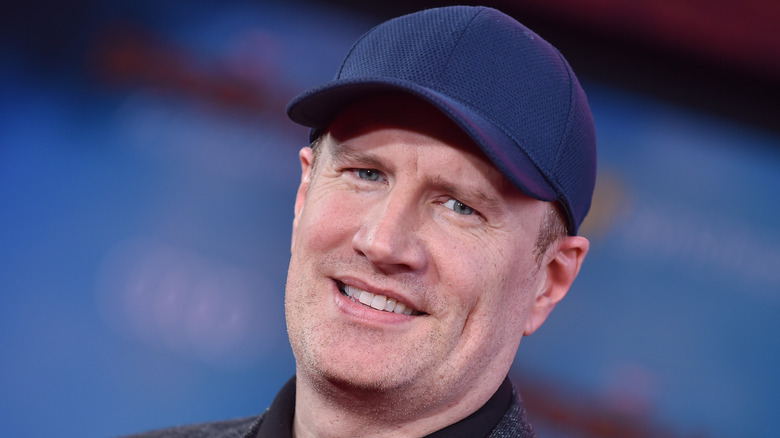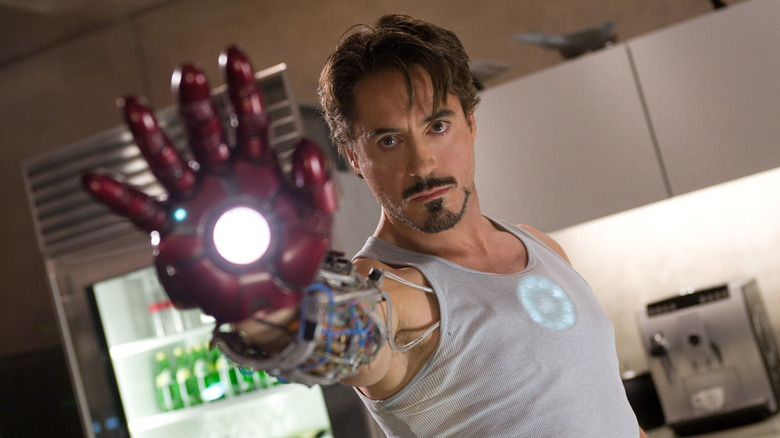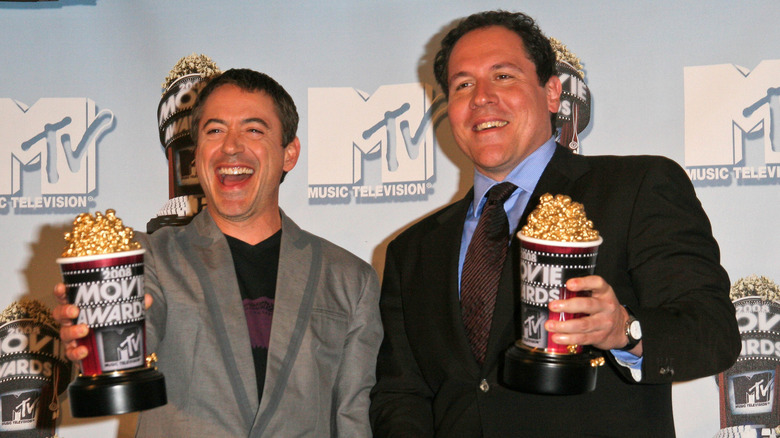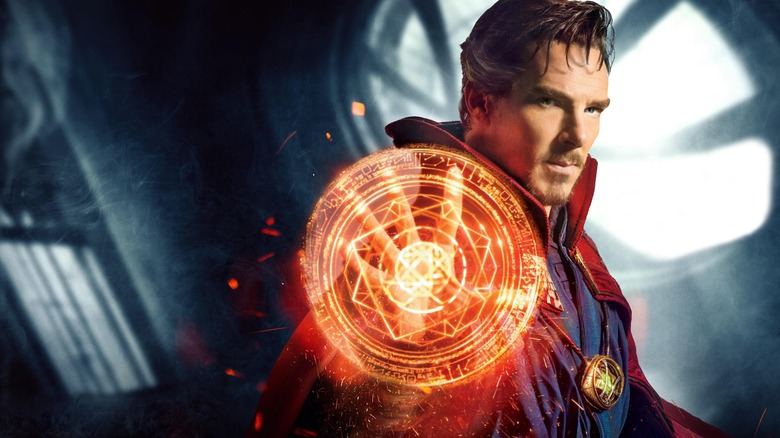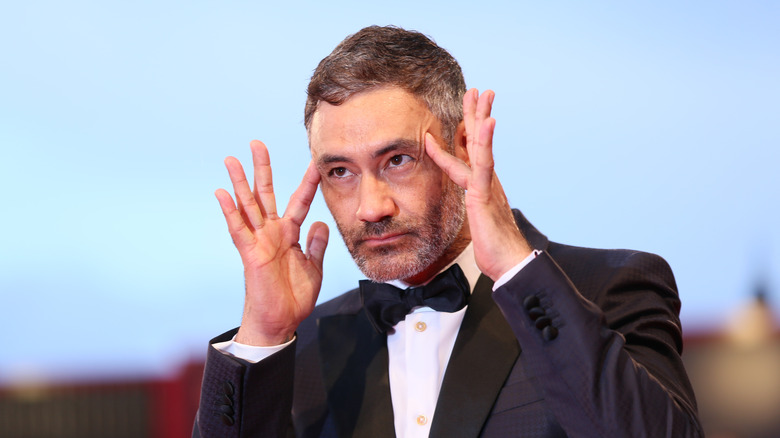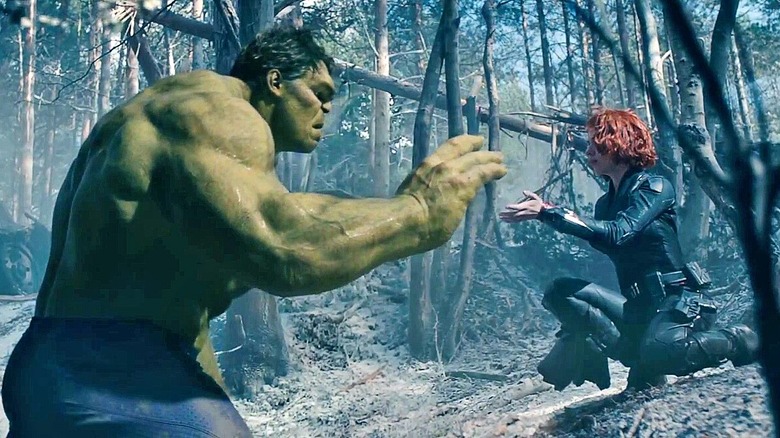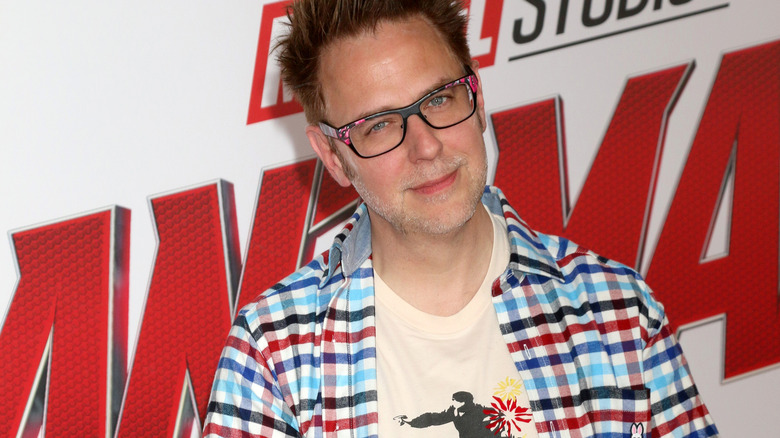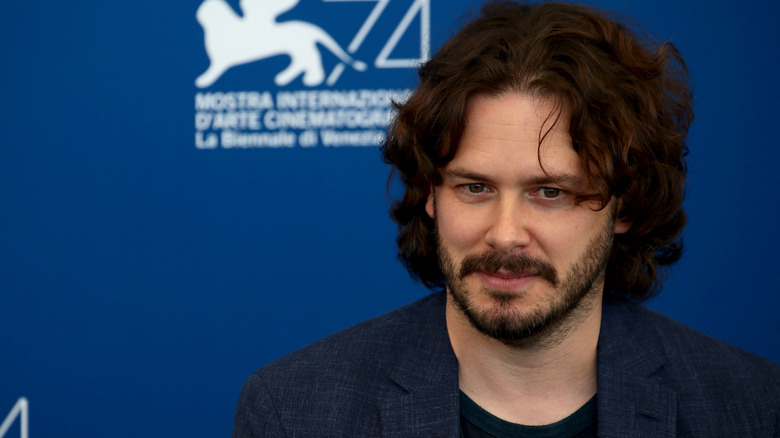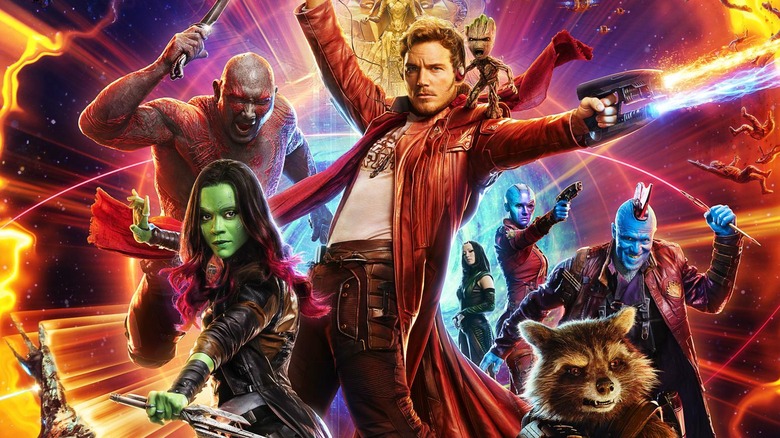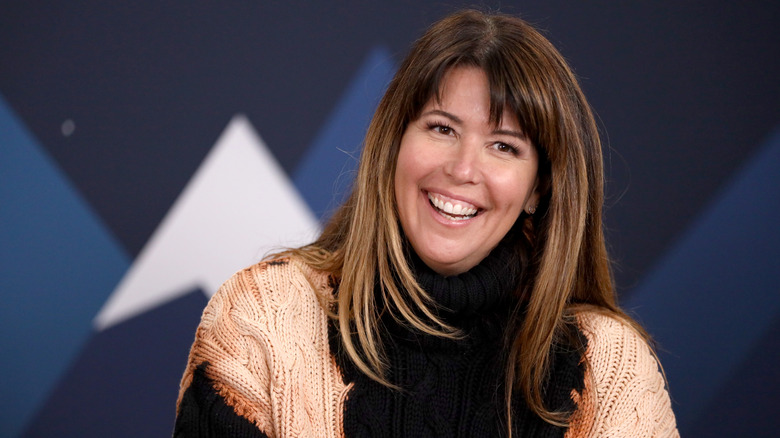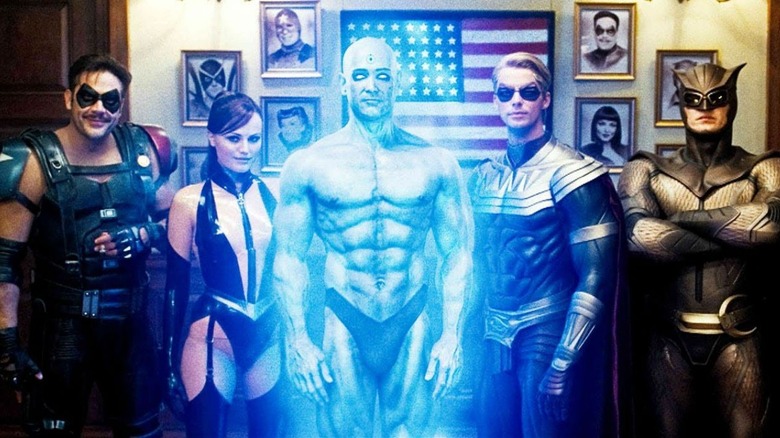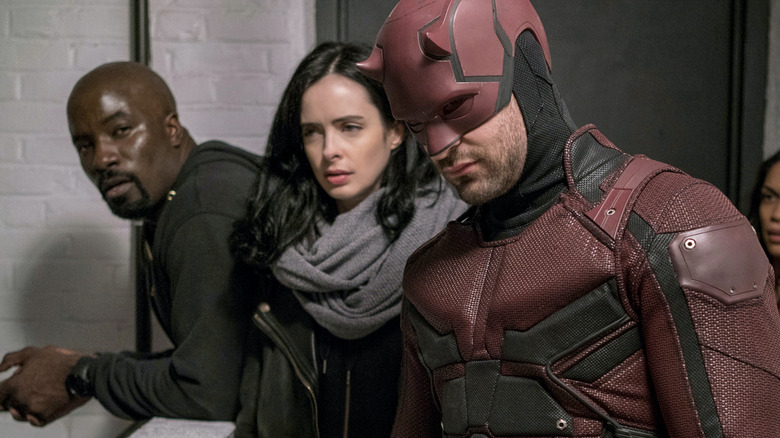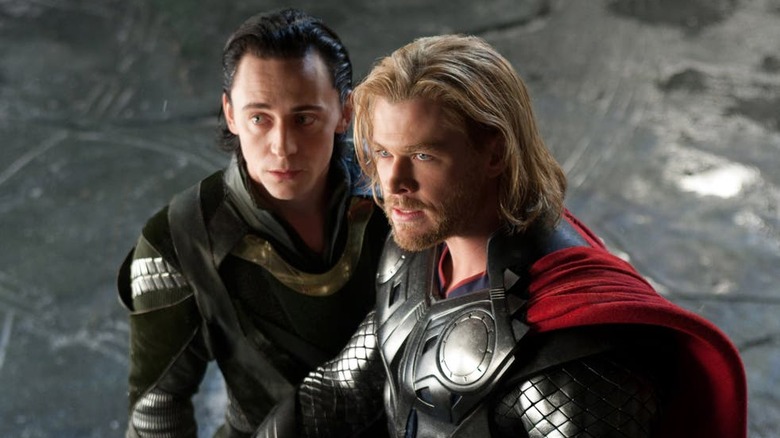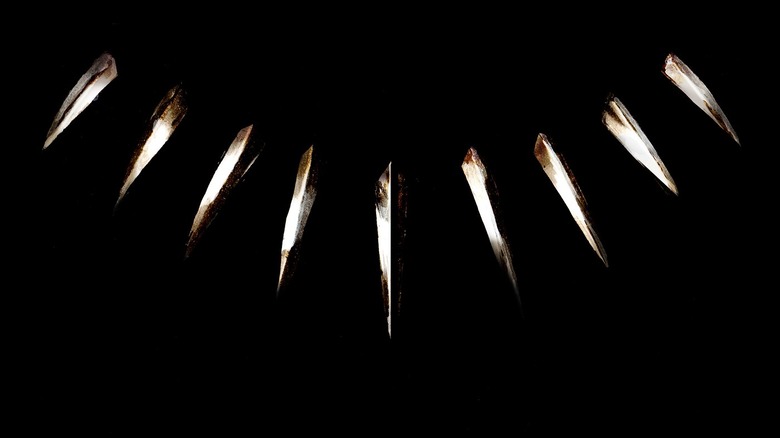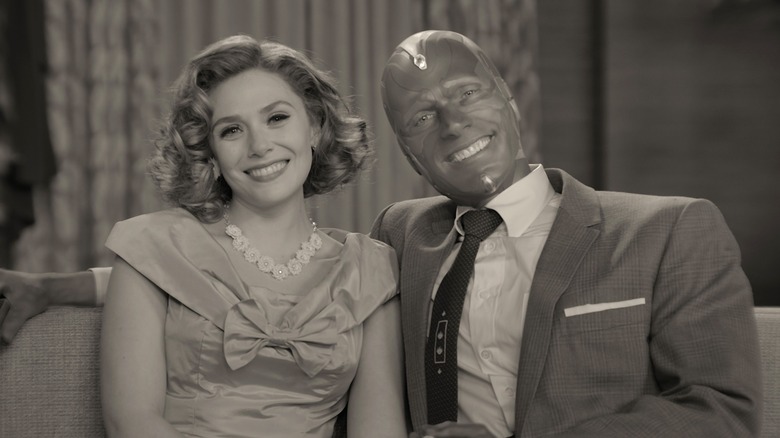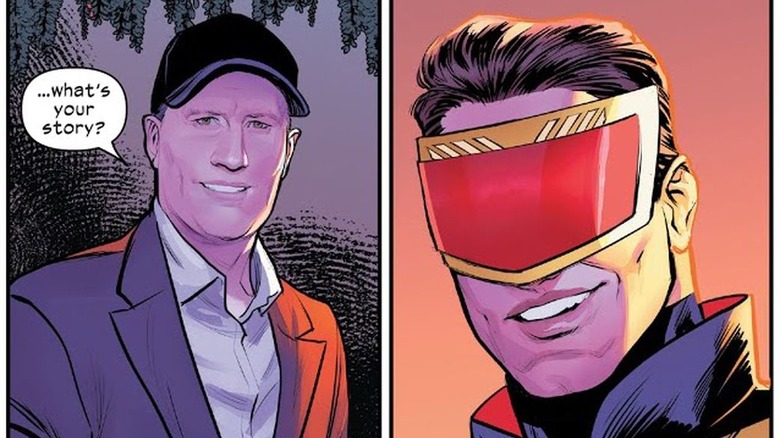What Are The Best And Worst Decisions Kevin Feige Has Made With The MCU?
Ask any random person on the street, "Who calls the shots in the Marvel Cinematic Universe?" and most of them will say they don't know. Some may say it's the iconic Stan Lee (R.I.P.), who co-created many Marvel characters in the 1960s, but that's the wrong answer. The correct folks will tell you it's Kevin Feige, who became president of Marvel Studios shortly after Avi Arad left the organization in 2006, and is widely credited as the brains behind the shared movie continuity that's made the studio a box office titan — and made a handful of people rich beyond their wildest dreams.
Feige doesn't control every element of all things MCU, of course. Marvel Entertainment CEO Isaac "Ike" Perlmutter and the mythic "creative committee" had a serious say in matters up until 2015. Also, hundreds of people work at Marvel; surely, Feige's not the only employee who influences what ultimately becomes MCU content. But because he's the face of the organization, inevitably, the public will credit him with ideas that other people came up with, and blame him for missteps he had nothing to do with.
Maybe he's more like Stan Lee than we realized.
Let's look at the best and worst things about the MCU, as it has come together — "assembled," you might say — under Feige's watch.
Worst: Overusing a formula
Let's say someone told you they just saw a Marvel movie about an exceptional but emotionally stunted man who enters a situation that directly or indirectly enhances his abilities. In order to save the day, he must learn to become less of a jerk before the end of the story. Would you know if they were talking about 2008's "Iron Man," 2014's "Guardians of the Galaxy," 2011's "Thor," or 2016's "Doctor Strange"? You would not.
What if they mentioned the film in question ends with a spectacular CG showdown full of "Bam!"s and "Pow!"s and other loud noises? That doesn't narrow things down much, either.
Perhaps the problem here isn't simply that Marvel movies can be formulaic. The redundancy issue applies to action and fantasy films across the board, especially superhero origins. The first "X-Men" movie from 2000 falls into the same pattern, for instance. But when a string of movies all exist in the same fictional timeline, if they're telling similar stories, that sameness is going to look very conspicuous very quickly.
Best: Finding the right directors to set the tone
Some trial and error is certainly visible throughout the first six films of the MCU — often shorthanded as "Phase One" — but the choice of directors ensured an essentially solid foundation for the colossal chronicles to come.
Ex-Marvel Studios CEO Avi Arad hired Jon Favreau to direct "Iron Man" after Favreau met Marvel's executive team while playing Foggy Nelson in 2003's ill-appreciated "Daredevil." Kevin Feige was in charge by the time Kenneth Branagh — known for his hyper-kinetic, extra-wrought, sometimes literally-Shakespearean sensibilities — came aboard to turn Jack Kirby's vision of Norse mythology into a space opera for "Thor." Having directed 1991's "The Rocketeer," Joe Johnson's demonstrated penchant for War World II-based adventure made him a clear choice for 2011's "Captain America: The First Avenger." And Joss Whedon — with his track record of juggling multiple characters in fantasy-action ensembles — seemed practically born to write and direct 2012's "The Avengers."
Worst: Overusing the snarky hero dude archetype
Stephen Strange is a medical doctor whose powers come from magic. Tony Stark is an inventor whose powers come from technology. Apart from that, they're basically the same snarky, arrogant rich guy.
Take Thor's hammer away, and he's a somewhat dumb, cocky surfer dude — virtually interchangeable with Star-Lord, even to the extent of being played by another hunky guy named Chris. Setting powers aside, the primary differences between Ant-Man, Star-Lord and Thor is that Ant-Man has a daughter he feels appropriately responsible for and is not played by a Chris. Other than that, all three characters have a number of the same qualities.
Steve Rogers is played by a hunky blonde Chris, but he resonates more like a product of the wide-eyed, wholesome Luke Skywalker mold than the cynical Han Solo mold that shaped all these aforementioned irreverent rascals and rogues. Not only did the MCU release more than 15 movies before featuring a Black main character, King T'Challa is also the first MCU hero who isn't known for wisecracking and quipping constantly. Humor is a really effective tool for deflating superhero stories' tendency to get overblown, but it's a well Marvel has returned to a lot over the years, in remarkably similar ways.
Best: Expanding with up-and-coming directors
New writers and artists replace the teams calling the shots for Marvel and DC comics characters at least once every few years; it's the simplest way to keep our beloved corporate-owned intellectual properties from growing stale. So if Kevin Feige and Marvel Studios give preference to directors with fresh ideas over folks with a dozen or more films on their resume, for the moment, that strategy appears sound.
Taika Waititi was known for low- to mid-budget comedies before 2017's "Thor: Ragnarok." Ryan Coogler had a certified hit to his credit in the form of 2015's "Creed," but that was the extent of his track record with major studio projects going into 2018's "Black Panther." So the directors of arguably two of the best MCU films were definitely not established fantasy-action filmmakers before Marvel snatched them up.
Will this trend continue? Well, we don't really know anything about "The Eternals" yet. We do know Kevin Feige can brag that he hired Chloé Zhao before "Nomadland" dominated the 2021 Oscars, though.
Worst: Where's the love?
Hardly anybody ever has sex in the MCU. Tony Stark sleeps with a reporter at the beginning of "Iron Man," but that may be the only confirmed instance of a main character having intercourse in the entire 20-plus MCU film series. (Not counting anything from Netflix Marvel, or Wanda and Vision pushing their beds together on "WandaVision.")
"They gotta make movies kids can see," you might say. Well, how come it's okay to show impressionable young minds constant violence — there's an intergalactic genocide in 2018's "Avengers: Infinity War," for cryin' out loud — but not okay to imply two characters get naked together? "We realize that society unfortunately says cinematic displays of physical affection are much more taboo than violence," you could reply. But remember what the Joker says about society?
Granted, the MCU has to live somewhere. And no single film series has the power to make sexuality in movies more acceptable than violence; not even if Kevin Feige wishes desperately for Black Widow and Hulk to knock boots just so he could figure out how that would work. But a little romance would go a long way toward adding deeper emotional stakes to the MCU.
Best: Staying on friendly terms with James Gunn
In 2017, "Guardians of the Galaxy" writer-director James Gunn was targeted by political extremists who re-circulated terrible edgelord jokes he'd tweeted 10 years prior. Disney — fresh off a scandal surrounding a racist tweet from ABC star Roseanne Barr — fired Gunn from "Guardians of the Galaxy 3," much to the chagrin of the cast.
In 2019, Disney announced it had reversed its decision and Gunn would return for "Guardians 3" after all.
Reports regarding how much Kevin Feige fought Disney's original choice to dismiss Gunn are a little ambiguous; but we can say with relative certainty that had Feige opposed Gunn's return, it wouldn't have happened. It's also worth noting that Feige, ever the diplomat, made sure to speak well of Gunn in the press.
"One thing you know about James Gunn, he makes cool films," he told MTV during a 2019 red carpet interview at the Golden Globes.
Worst: Letting Edgar Wright go
Upon the release of "Ant-Man and the Wasp: Quantumania," slated for 2023, Peyton Reed will become the only person whose last name isn't Russo or Watts to direct three MCU movies. Not only is there nothing wrong with the Ant-Man franchise, some folks argue it's the most underrated branch of the entire series. So nobody can say Edgar Wright's much-publicized departure from "Ant-Man" in 2014, after years of shepherding the project through development, damaged the franchise beyond repair. Still, it remains a painful example of how the studio's blockbuster formula can end up squeezing talented filmmakers out of a gig.
"I wanted to make a Marvel movie but I don't think they really wanted to make an Edgar Wright movie," the "Scott Pilgrim vs. The World" (2010) and "Shaun of the Dead" (2004) director told Variety in 2017. In the end, Wright opted to focus on other projects, rather than commit to a film over which he had limited control. He got to make 2017's "Baby Driver" instead, so everything worked out ... except now we'll always wonder what could've been if Marvel had let Wright shoot the script he'd written the way he wanted.
Best: Maintaining a sense of humor
The MCU would not be the media goliath it is without appealing to a general population that has never read a comic book. There is a pile of different factors that contribute to Feige and the rest of the Marvel team pulling that off, but the films' refusal to take themselves too seriously warrants emphasis.
None of the movies cross over into full-blown parody or satire, and there's plenty of earnest gravitas throughout the MCU. But maintaining a breezy, light-hearted tone roughly 65 percent of the time probably helps new viewers who'd otherwise feel like they walked into the middle of a "Dungeons & Dragons" game that started years earlier.
People used to think they needed to read a bunch of superhero comics to understand superhero movies. Perhaps that's no longer a widely-held notion; but sometimes, you do need to see a bunch of superhero movies to understand superhero movies.
Worst: Not keeping Patty Jenkins in the fold
Before making her mark in superhero cinema with 2017's "Wonder Woman," Patty Jenkins was signed up to direct 2013 "Thor: The Dark World." Initially, it was reported that she'd departed the project due to a case of the happily empty euphemism that is "creative differences," but she got more specific in an interview with Vanity Fair. "I did not believe that I could make a good movie out of the script that they were planning on doing," she told the magazine in 2020.
The completed "Thor: The Dark World" largely vindicates Jenkins's concerns, and — according to Rotten Tomatoes — remains the most poorly reviewed feature-length MCU project to this day.
In hindsight, Feige clearly should've facilitated a script that Jenkins could have gotten behind. If he had done so, "Thor: The Dark World" would likely have met a better fate with audiences and critics — and Jenkins could have stayed in the Marvel fold, leaving Warner Bros. to find someone else to direct "Wonder Woman." Film fans should still be happy we got the "Wonder Woman" we did, of course, but from a business standpoint, Feige's failure to hang onto Jenkins only helped the competition.
Best: Avoiding mindless devotion to the source material
Ask any comic book nerd if they have a favorite comics story, and they'll tell you they've read them multiple times. So why would we want to see exact, panel-by-panel, live-action replications of famous comics stories on the big screen? We already know all the endings. If, purely hypothetically, there's a surprise twist at the end of, let's say, 1986's "Watchmen," we see it coming literal years in advance.
The MCU makes huge departures from its source material on a routine basis. "Captain America: Civil War" from 2016 borrows the foundational gist of the 2006 Marvel Comics event of the same name, then goes off in a completely different direction.
In the comics, Thanos snaps his fingers and erases half of all life at the beginning of 1991's "The Infinity Gauntlet," not the end of "Infinity War," and let's not even start on how little the "Avengers: Infinity War" of 2018 has in common with 1992's "Infinity War" comics saga.
The changes have kept the entire institution of the MCU feeling lively and modern. Here in 2021, do we all really want our movies copying dialogue and stories that were intended for children in the 1960s?
Worst: Basically ignoring Marvel TV for years
Some of us are old enough to remember 2015, when it seemed as though street-level heroes of the MCU partook in grimmer, darker adventures on streaming TV. Eventually, Disney+ came along, and Netflix decided not to spend tons of money essentially advertising a competitor. That was the end of "The Defenders" and its handful of adjacent series.
But the Netflix wing of live-action Marvel felt pretty detached from the movies well before Disney+. Feige, by his own admission, sort of ignored Marvel Television, which was overseen by former Marvel executive Jeph Loeb at the time.
"My history at Marvel is vast and involved zero control for a long time, so I paid more attention to the things I gained control over rather than the things I didn't have control over," he said in a recent press tour, according to Deadline. "TV at that time was just one of those things that we didn't..."
We suppose in the mid-2010s, Feige had too much on his plate to worry about Netflix shows he didn't work on. But now, if/when the MCU brings Daredevil or any of his grimdark pals into the mix (and Feige has expressed a "maybe someday" attitude about that prospect), potentially replacing the actors, and having to explain whether the Netflix shows take place in an alternate universe, will be a pain in the neck for everyone involved.
Best: Not casting too many megastars in lead roles
Marvel Studios might've been right to suppose that the general public needed the name recognition of Robert Downey Jr., Gwyneth Paltrow to find their way to "Iron Man." But as soon as the grander MCU became a viable prospect, Marvel had practical reasons to avoid casting, let's say, Brad Pitt and Tom Cruise as the hero and villain of "Thor."
To indulge some speculation, let's assume relative unknowns at the time like Chris Hemsworth and Tom Hiddleston could be locked into longterm, multi-film commitments at far less expense than established Hollywood A-listers. Before Captain America, Chris Evans was best recognized as Johnny Storm from a pair of mid-'00s Fantastic Four movies — so we can presume he was not a comparatively costly hire, either.
When mega-famous faces like Natalie Portman, Anthony Hopkins, and Scarlett Johansson showed up in early MCU movies, they played supporting characters whose continued presence wasn't necessarily essential for future projects. Today, the MCU dominates popular culture, and Angelina Jolie playing an obscure Jack Kirby character doesn't seem at all outside of anyone's expectations. But Marvel's lack of reliance on pre-existing celebrity power has allowed them to create new stars — and save a few bucks in the process.
Worst: What about the music?
Everybody recognizes the opening theme from "Star Wars," and everybody recognizes "The Imperial March" within three notes. Everybody recognizes the theme from "Jaws" within two notes. When we hear Celine Dion's "My Heart Will Go On," we think of 1997's "Titanic" and vice versa.
The point being, you'd think that with 23 movies, Marvel would've produced more than a few catchy songs. Credit where it's due: The Avengers main theme is sufficiently triumphant, the "Black Panther" OST by Kendrick Lamar melts our faces off, the "Guardians of the Galaxy" mixtape compilations are fun if you're into '70s rock nostalgia trips, and "Thor: Ragnarok" includes its share of mighty Led Zeppelin needle drops.
But apart from those exceptions, the soundtrack of the collective MCU is pretty bland. It's nothing most audience members will ever notice on a conscious level, but as evidenced by the aforementioned examples, a killer soundtrack can really make a difference for a film. Marvel's movies have led Hollywood for years — their music should follow suit.
Best: Embracing Disney+
In 2021, Marvel launched its Disney+ limited series with "WandaVision," "The Falcon and the Winter Soldier," and "Loki" all arriving before the start of summer. With nine announced series yet to premiere, it's way too early to describe the collective effort of Marvel on Disney+ as a total success. However, following the 2020 pandemic when both of the studio's film projects were delayed into de facto oblivion, "WandaVision" allowed Marvel to maintain a major presence in the pop cultural discourse. Without "WandaVision," some of us might've even forgotten Marvel existed for a little while. Can you even imagine what that would've felt like?
Folding Marvel Television into Marvel Studios under Feige and directing its efforts toward Disney+ was Disney CEO Bob Iger's idea, so we shouldn't give Feige all the credit for the state of Marvel TV. But Marvel on Disney+ has already made a bigger impact on upcoming Marvel films that the Netflix shows ever did, and Feige at minimum came up with the title for "WandaVision" ... Well, with some indirect assistance from Spike Lee, anyway.
Worst: Attending the Hellfire Gala
Emma Frost doesn't exist in the MCU yet, but that doesn't mean she can't throw the fancy party to end all fancy parties.
In recent months, the events of Marvel's line of X-Men and X-Men-adjacent comics have revolved around the Hellfire Gala — a Met Gala-type event designed for human political and business leaders, and superheroes, to visit the mutant island of Krakoa. A handful of celebrities make the trek to the home of the X-Men, including Marc Maron, Eminem, Patton Oswalt, and ... Kevin Feige. In a memorable panel from "X-Men #21" (2021) by writer Jonathan Hickman and multiple artists, the Marvel movie honcho approaches Cyclops and asks, "What's your story?"
Feige's evident intention to get to know the X-Men better before he starts making movies about them is commendable. But let's not forget that Thor, Iron Man, Captain America, and other characters who exist in the MCU also attend the Hellfire Gala. If Feige spends too much time in the company of imaginary characters whose stories he controls, he could collapse the barrier between fiction and reality, rupture the foundational concept of existence, and drive every living creature horribly insane.
And okay, so this is kind of a goofy pick. But Feige is clearly doing most things right — who can blame us for reaching?
